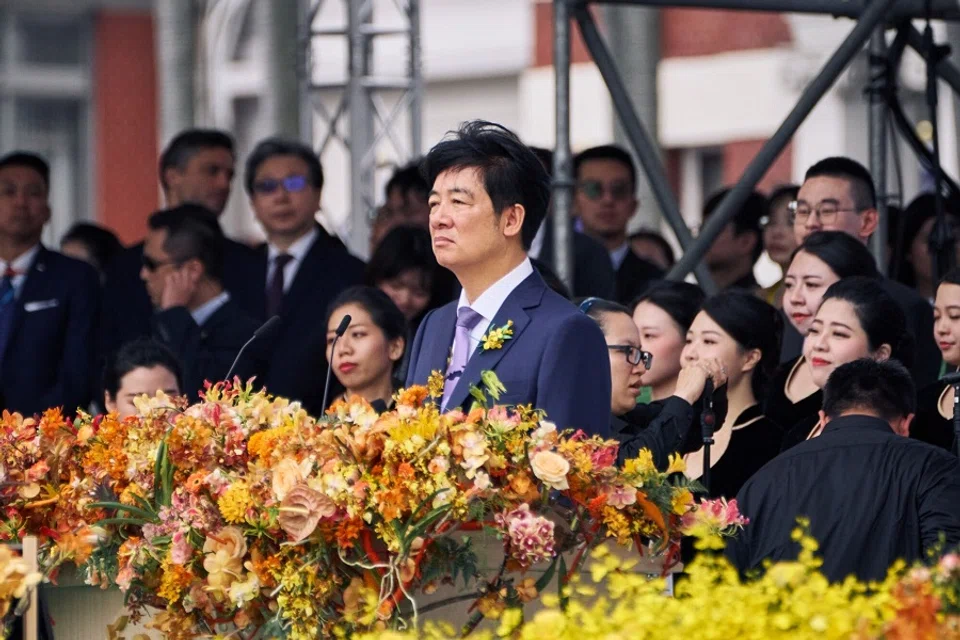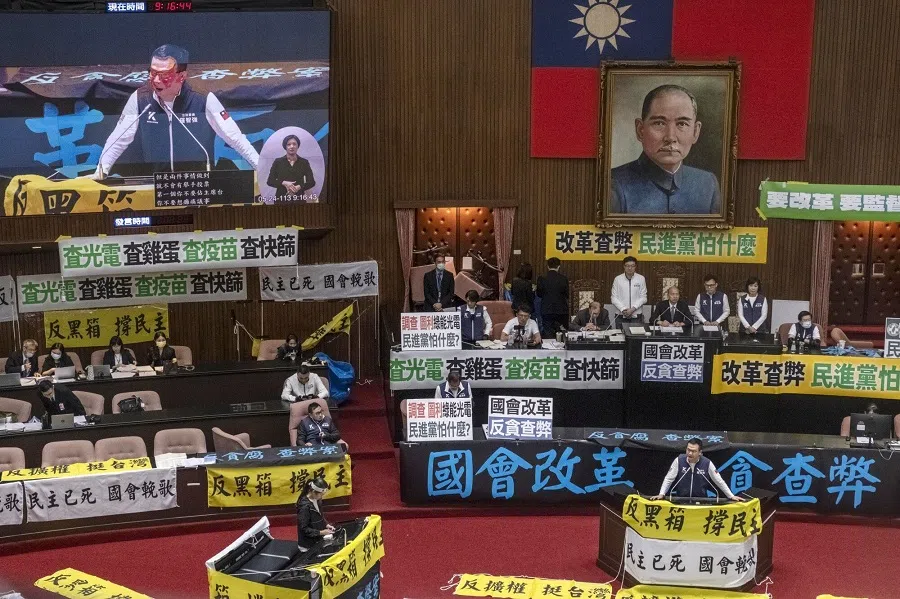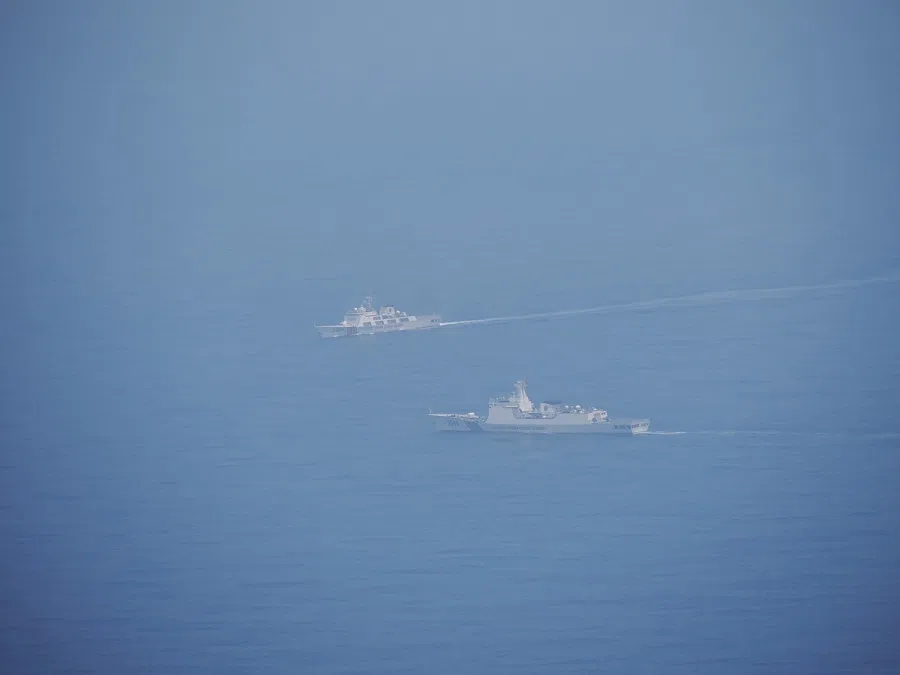Taiwan President Lai Ching-te wagers that China will not attack Taiwan?
Zaobao correspondent Woon Wei Jong rounds up various reactions to Taiwan President Lai Ching-te’s inauguration speech, observing that the strong tone and emphasis on the pro-unification/pro-independence divide are calculated moves on the part of the ruling party.

Taiwan President Lai Ching-te’s inauguration speech on 20 May, hailed as “the most independence-leaning in history”, surprised many experts with its strong tone. Recent commentaries on the speech raise an intriguing question: is Lai betting that the mainland would not actually launch an attack?
Some observers are certain this is the case, while others have their doubts. The fact that China launched a two-day military exercise around Taiwan three days after the speech lends some credence to this observation.
The eight military drill zones announced by the mainland’s People’s Liberation Army (PLA) either cross the median line of the Taiwan Strait or cut into the prohibited and restricted waters of Taiwan’s outer islands. One expert said this represents a “comprehensive rehearsal of a military attack on Taiwan”, showcasing the mainland’s continuous improvement in its capacity to impose a blockade on Taiwan and thwart external aid.
Drills working in the DPP’s favour
Typically, the stock market is most sensitive to crises. But on the first day of the military drills, the Taiwan Stock Exchange Capitalization Weighted Stock Index (TAIEX) rose, with blue-chip stock Taiwan Semiconductor Manufacturing Company (TSMC) setting a new high. At least on the surface, institutional and retail investors were unaffected and unperturbed by the military exercises.
Unsurprisingly, some commentators suggested that the governing Democratic Progressive Party (DPP) might have even found the drills beneficial, as they helped mobilise members of the public to gather at the Legislative Yuan (LY) on 24 May. This would keep the heat on the opposition Blue and White camps, which have joined forces and hold the majority in the LY.
... he hopes to leverage mass movements to tackle the problem of an opposition that outnumbers the government.

The DPP was quick on the uptake, with DPP caucus convener Ker Chien-ming calling an impromptu press conference on the morning of the military exercise, adopting “smearing red” (抹红) tactics against the opposition. He accused them of colluding with the Communist Party of China (CCP) to “sell out Taiwan” by pushing for reform bills to rein in and weaken a government that has Taiwan’s back.
Lai’s recent praise of Ker for “resolutely defending democracy” on Facebook serves as evidence that the two share similar views on how to handle the opposition. But it remains to be seen if the mainland’s military exercise did give the DPP ammunition to stoke public animosity against a common enemy or brand the opposition as a mainland-friendly, pro-unification camp.
Using mass movements to deal with the opposition
Lai Ching-te leads a weak government where the president received only 40% of the votes, and the three-party legislature lacks a majority. Faced with a situation where 60% of the public does not support the government, as well as an opposition that outnumbers the governing party, the ruling DPP has its hands tied when it comes to executing policies.
Some commentators well-versed in DPP tactics pointed out that Lai could be using the independence-unification dichotomy to distinguish the political parties and solidify his power. Not only that, he hopes to leverage mass movements to tackle the problem of an opposition that outnumbers the government.

Former DPP legislator and current commentator Julian Kuo, who has relinquished his DPP membership, stated on a live online show on 23 May that when Lai stressed during his inauguration speech that the Republic of China (ROC) and the People’s Republic of China “are not subordinate to each other” and urged China to “face the reality of the ROC’s existence”, it is a blatant denial that both sides of the strait belong to one China.
Though Lai did not mention the words “Taiwan independence”, it is a strongly-worded declaration of Taiwan independence and a desire to maintain de facto Taiwan independence, in resistance to the mainland’s annexation.
DPP thinks mainland would not use force
Kuo interpreted that Lai played the “Taiwan independence” card in his inaugural speech because he believes that the mainland would not use force on Taiwan at this juncture. Not only that, the heightened national security tensions would also serve to bolster the DPP’s governance.
Lai is leveraging the political divide to “take down the Kuomintang (KMT) and destroy the Taiwan People’s Party (TPP)”. He is certain that the KMT would not dare to push for reunification, and by “smearing red” the TPP, he hopes to win over the votes of youths who value Taiwan’s autonomy.

Lai’s public exhortations of de facto independence or “pragmatic Taiwan independence” are indeed testing the mainland’s bottom line and stepping on the red line between both sides of the Taiwan Strait.
However, as long as the mainland only conducts military drills around Taiwan and does not wage war during Lai’s four-year term, by the time of the 2026 local elections and the 2028 presidential election, the DPP could argue that advocating for Taiwan independence did not lead to war. It could label the opposition as CCP collaborators and prolong its long-term rule.
... it is clear that the other side of the Taiwan Strait did not perceive any goodwill. They may have even abandoned their illusions and started preparing themselves for a confrontation with Taiwan.
Pro-unification/pro-independence dichotomy a political tool
The pro-unification/pro-independence divide still holds sway in Taiwan politics as many polls show that mainstream public opinion either “rejects” or “fears” unification; moreover, about 80% of the surveyed voters favour maintaining the status quo, hoping to maintain Taiwan’s way of life and democracy and freedom. This is interpreted by the DPP to mean “supporting the status quo of de facto independence”.
While Lai emphasised that he harboured goodwill towards the mainland in his inauguration speech, he repeatedly called the country “China” and demanded the resumption of tourism on a “reciprocal basis”. He did not respond to “both sides of the Taiwan Strait are Chinese people” and made no mention of the Cross-Strait Act which stresses “one country, two areas”. Instead, he severed Taiwan’s ties to the mainland across the ethnic, cultural, and historical dimensions.
Based on the mainland’s consecutive days of high-intensity political intimidation and military coercion, it is clear that the other side of the Taiwan Strait did not perceive any goodwill. They may have even abandoned their illusions and started preparing themselves for a confrontation with Taiwan.

Some people think that Lai’s brash confidence comes from his belief that “the CCP will not attack and the US will come to the rescue”; moreover, with the view to improve China-US relations, the mainland is unlikely to attack Taiwan before the US elections. But the US elections will be over in six months. What if the cut and dried Donald Trump returns to office — will the US’s commitment to Taiwan’s defence expire?
With its many military drills, the mainland has demonstrated its grand strategy of “encirclement and annihilation of enemy reinforcements” (围点打援). This is to encircle Taiwan, deter foreign aid from intervening, and to fight for international support for peaceful reunification through diplomatic channels. These actions pose serious challenges to Taiwan’s national security strategy in terms of defence, diplomacy and cross-strait policy.
... who is to guarantee that when the “wolf” next appears, it will not be an actual attack?
China-US relations and their domestic political situations continue to ratchet up the risks in the Taiwan Strait. With the mainland’s military drills becoming increasingly real and the “wolf” being treated as a “paper tiger”, who is to guarantee that when the “wolf” next appears, it will not be an actual attack?
The Taiwan authorities have repeatedly rejected the 1992 Consensus, which allows for political ambiguity between both sides of the Taiwan Strait. Now by flying high the banner of de facto independence, while banking on the belief that the mainland will not initiate an actual attack, have they gone overboard?
This article was first published in Lianhe Zaobao as “赖清德押注大陆不会真打?”.





